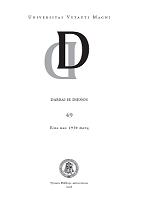ITALIŠKI LIETUVIŲ ISTORIOGRAFIJOS ŽYMENYS
ITALIAN MARKINGS IN LITHUANIAN HISTORIOGRAPHY
Author(s): Aušra BaniulytėSubject(s): Cultural history
Published by: Vytauto Didžiojo Universitetas
Keywords: istoriografija; baltistika; renesanso kultūra; historiography; aristokratija; Baltistics; Renaissance culture; aristocracy.
Summary/Abstract: This article presents an analysis of Lithuanian-authored historiographical works on Lithuania‘s relations to Italy (previously the states of the Apennines peninsula). The first to undertake Lithuanian historical and cultural investigations in this direction were historians educated by, or active at, Vytautas Magnus University in Kaunas, including Jonas Totoraitis, Paulius Rabikauskas, Paulius Jatulis, and Zenonas Ivinskis; the latter three researched Italian archives (mostly Vatican and Roman) and wrote treatises based on studies of the development of Christianity in Lithuania and the historical cultural ties between Lithuania and Western Europe. Another trend in Lithuanian research on Italy focused on culture and took shape in Soviet-occupied Lithuania. Its basis was historical material preserved in archives and manuscripts in Lithuania and neighboring countries, largely consisting of texts from the Grand Duchy of Lithuania in the 16th and 17th centuries. Two prominent research directions here were (1) investigations of the development of Renaissance culture and humanism in Lithuania, exemplified by the work of Juozas Jurginis, Ingė Lukšaitė, Juozas Tumelis, Marcelinas Ročka, and others; and (2) investigations of Latin culture revived during the Renaissance, including studies of the theory claiming the Roman origin of the Lithuanian aristocracy, and of the Latin-language heritage of ancient Lithuania so rich in scholarly treatises. A special place in Lithuanian historiography is occupied by the works of the Italian Balticists Pietro Umberto Dini and Guido Michelini. They were not only interested in the Lithuanian language but devoted attention to Lithuanian culture and Lithuanian-Italian cultural relations. Their work makes it clear that despite the political isolation that had long separated Lithuania and Italy, there was persistent scholarly interest on both sides in each other‘s country. The variety of Italian topics in the Lithuanian historiography of the last decade shows a growing interest in this field, caused in part by the possibility of living and studying in Italy and by the increased cultural cooperation between Lithuania and Italy. This interest was also stimulated by the search for new topics in the subject; and as the inter-war period began to be increasingly studied, cultural cooperation between the two countries during that period naturally became a favored topic of research. Thus research on Italian themes in Lithuanian historiography is topically diverse and presents unique angles on Lithuanian culture and history.
Journal: Darbai ir dienos
- Issue Year: 2008
- Issue No: 49
- Page Range: 25-44
- Page Count: 20
- Language: Lithuanian

